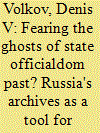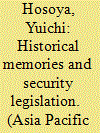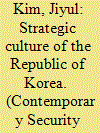|
|
|
Sort Order |
|
|
|
Items / Page
|
|
|
|
|
|
|
| Srl | Item |
| 1 |
ID:
142763


|
|
|
|
|
| Summary/Abstract |
The overarching task of this article is to directly present the main crucial venues – a prototype road map of Russia's study of Persia in the context of foreign policy – to the students of Russia and its relations with Persia, as well as, more specifically, to researchers of Russia's late Imperial and early Soviet policy towards Middle East and Oriental studies therein. Simultaneously, taking into consideration the equivocal and quite often controversial nature of conducting archival research in Russia, it is worth knowing that a scholarly activity, seemingly conventional and rather straightforward in the West, can turn into an adventurous quest in present-day Russia, hampered by various factors. So the article also touches upon the current condition of the archival industry in present-day Russia, with the emphasis on the traditionally most burning issue in this field, namely the unjustifiably excessive secrecy, underpinned by the discourse of protecting Russian state interests, which can turn out to be an unexpected obstacle to research into a period even dating back a hundred years.
|
|
|
|
|
|
|
|
|
|
|
|
|
|
|
|
| 2 |
ID:
142984


|
|
|
|
|
| Summary/Abstract |
In Japan, two political issues came to the forefront in the year marking the 70th anniversary of the end of World War II. While usually dealt with separately, the Statement by Prime Minister Shinzo Abe, issued on August 14, 2015, and the security legislation based on the concept of a “Proactive Contribution to Peace” both relate to the question of how we view Japan's place in international society. This article examines how both these issues support Japan's commitment to maintaining its identity as a peace-loving nation and its responsibility to contribute to international peace and prosperity.
|
|
|
|
|
|
|
|
|
|
|
|
|
|
|
|
| 3 |
ID:
132482


|
|
|
|
|
| Publication |
2014.
|
| Summary/Abstract |
It is ironical that relations between China and Japan, despite their sharing a history of two millennia as neighbours, are ranked as the number one hostile bilateral relationship in the G-20'. Events since the end of 19th century have created a long baggage of historical memories that strongly define their relations in the present day. However, the strong economic integration between the two countries has resulted in the third largest bilateral trade relationship in the world, amounting to $334 billion2 (2012 figures) just behind the US-Canada and US-China bilateral relationship at $645 billion3 and $536 billion' respectively. China surpassing Japan in 2010
|
|
|
|
|
|
|
|
|
|
|
|
|
|
|
|
| 4 |
ID:
132872


|
|
|
|
|
| Publication |
2014.
|
| Summary/Abstract |
The strategic culture of the Republic of Korea (ROK or South Korea) is based on three pillars: attaining prosperity and strength as an enduring national purpose and objective; countering the existential North Korean threat; and maintaining a strong alliance with the United States. This strategic culture is grounded in history, especially in Koreans' sense of themselves as an ancient and homogeneous people, the minjok, and in a constructed martial heritage. Keepers of strategic culture include the national security establishment, the National Assembly, the media, the public, and the United States, but the most important keeper is the president, who ultimately defines South Korea's strategic interests and how they should be attained or guarded. Contemporary illustrations of South Korean strategic culture in action include defence reform measures, shifts in the American alliance, and the 'crisis of 2013', which included a North Korean nuclear test and extreme threats of war. This article reinforces the view that while strategic culture may be a universal concept, in its operationalized and practised form, the true value of the concept is that the unique and particularistic characteristics that define each specific strategic cultural tradition are placed at the centre of analysis. South Korea's strategic culture is unique, but if there is an aspect that can be applied to other nations it is that shared historical memory and public historiography are crucial factors that inform that nation's strategic culture
|
|
|
|
|
|
|
|
|
|
|
|
|
|
|
|
|
|
|
|
|